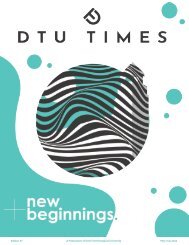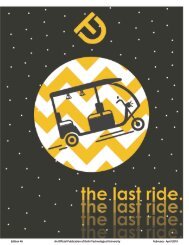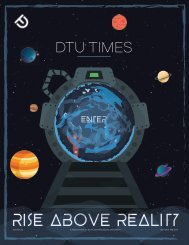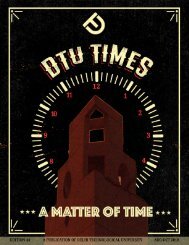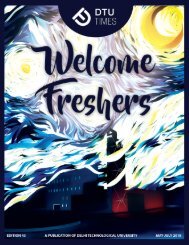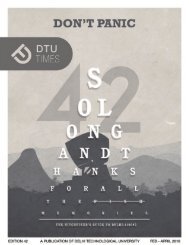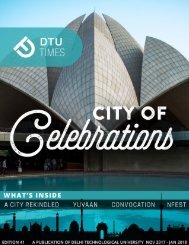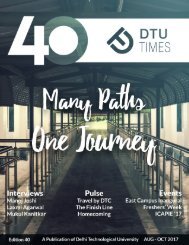Create successful ePaper yourself
Turn your PDF publications into a flip-book with our unique Google optimized e-Paper software.
Prof. Vijay Gautam, Dept. Of Mechanical
Engineering
• ‘Prediction of residual stresses in
biaxial stretching of tailor welded
blanks by finite element analysis’, IOP
Conference Series: Materials Science and
Engineering
• ‘Experimental and Numerical
Characterization of Residual Stresses in
Tailor Welded Blanks After Springback’,
Springer, Singapore
Dr. Chandra Prakash Singh, Assoc.
Prof., Dept. of Applied Mathematics
• ‘Matter creation in Brans-Dicke theory:
Observational tests and thermodynamic
analysis’, Physical Review D
• ‘Probing bulk viscous matter dominated
model in Brans-Dicke theory,
Astrophysics and Space’, Science
• ‘New holographic dark energy with bulk
viscosity in f(R,T) gravity’, Indian Journal
of Physics
Dr. Dinesh Kumar Vishwakarma,
Assoc. Prof., Dept. of Information
Technology
• ‘View-invariant Deep Architecture for
Human Action Recognition using Twostream
Motion and Shape Temporal
Dynamics’, IEEE Transactions on Image
Processing
• ‘A Two-fold Transformation Model
for Human Action Recognition using
Decisive Pose’, Cognitive Systems
Research
• ‘Sentiment Analysis using Deep Learning
Architectures: A Review’, Artificial
Intelligence Review
Dr. Rahul Katarya, Assoc. Prof., Dept. of
Computer Science & Engineering
• ‘Opinion Leader discovery based on Text
analysis in Online Social Network’, IEEE
International Conference on Information
Systems and Computer Networks (ISCON
2019), GLA University, Uttar Pradesh
• ‘A survey of Different Methods in finding
Latent Relationships among Complex
Networks’, ISCON 2019, GLA University,
Uttar Pradesh
• ‘Deep Learning for Opinion Mining: A
Systematic Survey’, ISCON 2019, GLA
University, Uttar Pradesh
Dr. Ram Singh, Assoc. Prof., Dept. of
Applied Chemistry
• ‘Design, synthesis and evaluation of
Coumarin-Phenylthiazole conjugates
as cholinesterase inhibitors’, Chemical
Biology Letters
• ‘Facile Synthesis of 2-Arylimidazo[1,2-a]
pyridines catalyzed by DBU in Aqueous
ethanol’, Proceedings of the Royal
Society A: Mathematical, Physical and
Engineering Sciences
Dr. Shilpa Pal, Assoc. Prof., Dept. of
Civil Engineering
• ‘Shear resistance of steel fibre reinforced
concrete beams’, Journal of Structural
Engineering
• ‘Optimization of base isolation
parameters using genetic algorithm’,
Journal of Statistics and Management
Dr. Sudarshan K. Valluru, Assoc. Prof.,
Dept. of Electrical Engineering
• ‘Design and implementation of L-PID
and IO-PID Controllers for Twin Rotor
MIMO System’, International Conference
on Power Electronics Control and
Automation, Jamia Millia Islamia, New
Delhi
• ‘Design of Intelligent Fuzzy Logic
Controllers to Control Trajectory Tracking
and Stabilization of Twin Rotor MIMO
System’, IEEE International Conference
on Engineering Technologies and
Applied Sciences 2019, Malaysia
• ‘Design and Real Time implementation
of fmincon , MOGA tuned IO-PID and
FO-PIλDμ Controllers for Stabilization
of TRMS’, International Conference
on Computing and Network
Communications (CoCoNet), Kerala
• ‘Experimental Investigation of Fully
Informed Particle Swarm Optimization
tuned Multi Loop L-PID and NL-PID
Controllers for Gantry Crane System’,
CoCoNet, Kerala
• ‘Optimization Strategy of Bio-Inspired
Metaheuristic Algorithms Tuned PID
Controller for PMBDC Actuated Robotic
Manipulator’, CoCoNet, Kerala
Dr. Anup Kumar Mandpura, Asst. Prof.,
Dept. of Electrical Engineering
• ‘Stacking seismic data based on
Ramanujan sums’, IEEE Geoscience and
Remote Sensing Letters
Mr. Deshraj Meena, Asst. Prof., Dept. of
Applied Physics
• ‘Phase dependent selectivity shifting
behavior of Cd2SnO4 nanoparticles
based gas sensor towards volatile
organic compounds (VOC) at low
operating temperature’, Journal of Alloys
and Compounds
• ‘Synthesis, characterization and gas
sensing properties of the rhombohedral
ilmenite CdSnO3 nanoparticles’, Physica
B: Condensed Matter
Dr. Mukhtiyar Singh, Asst. Prof.,
Dept. of Applied Physics
• ‘Graphene as charge transport layers in
lead free perovskite solar cell’, Material
Research Express
Ms. Navneeta Bharadvaja, Asst. Prof.,
Dept. of Biotechnology
• ‘Degradation of dyes using biologically
synthesized silver and copper
nanoparticles’,
Environmental
Nanotechnology, Monitoring &
Management
• ‘Media optimization using Box Behnken
Design for enhanced production of
biomass, beta-carotene and lipid from
Dunaliella salina’, Vegetos
• ‘Bio-plastic: An Alternative Solution to
Beat Plastic Hazard’, Fundamentals of
Plastic Waste Management
• ‘Microbial Remediation of Heavy
Metals’, Microbial Bioremediation &
Biodegradation
Mr. Paras Kumar, Asst. Prof., Dept. of
Mechanical Engineering
• ‘Microwave cladding on metallic surfaces:
A review’, Materials Today: Proceedings
Mr. Prashant Giridhar Shambharkar,
Asst. Prof., Dept. of Computer Science
& Engineering
• ‘Multiple Resource Management and
Burst Time Prediction using Deep
Reinforcement Learning’, International
Journal of Advances in Computer
Science & Its Applications
Dr. Rajesh Sharma, Asst. Prof., USME
• ‘Mapping disparities in education across
low-and middle-income countries’,
Nature
• ‘Mapping child growth failure across lowand
middle-income countries’, Nature
Ms. Ritu Agarwal, Asst. Prof., Dept. of
Information Technology
• ‘A Two-Phase Image Classification
Approach with Very Less Data’,
Computational Vision and Bio-Inspired
Computing
Mr. Rohit Beniwal, Asst. Prof., Dept. of
Computer Science & Engineering
• ‘A Smart Discussion Forum Website’,
International Conference on Soft
Computing and Pattern Recognition
2019, Hyderabad
Dr. Sudipta Majumdar, Asst. Prof.,
Dept. of Electronics & Communication
Engineering
• ‘Extended Kalman Filter Based Nonlinear
System Identification Described in Terms
of Kronecker Product’, International
Journal of Electronics & Communications
• ‘Extended Kalman Filter Based State
Estimation of MOSFET Circuit’, The
International Journal of Computation
and Mathematics in Electronics &
Electrical Engineering
DTU Times interviewed Mr. Vinod Dham, ‘Father of the Pentium Chip’, a DCE alumnus of the 1971 batch,
who was the Chief Guest at Convocation 2019. We also interviewed his batchmates Mr. Gulshan
Kapur, Mr. Subha Rao, Mr. Sudhir Khanna, Mr. Suman K. Kwatra, and Mr. Umesh Chaddha.
What are the major changes you have seen
between DCE of 1971 and DTU of 2019?
The DCE in 1971 was a small place. I can draw a whole
map for you consisting of the library and the four
departments. This campus is a huge one, of area 165
acres, while our campus was only around 10 acres at
Kashmere Gate. There is no comparison; what you are
doing here is amazing. In 1971, probably less than 250
students passed out, while here, almost 1800 students
graduated this year.
Engineers today in India are failing to
capture the wide gap between the academic
curriculum and industry requirements.
What do you think students should do at an
individual level to bridge this gap?
There always will be a difference in the industry here
and the industry abroad, and that is why I went abroad
to get my Master’s degree. Nowadays, however, I
see a lot of Ph.D. students here, so hopefully, we are
improving the scope for higher studies here as well.
But earlier, going abroad was the only way to dig
deeper into a subject. There are a number of job-ready
courses these days which are gaining prominence.
These are aimed at bridging the gap between what
is taught in the university and what is required in the
industry.
Don’t work too long for one organisation. 5-7 years
is a good time to switch. If you are there in any
organisation, look for opportunities to show your
brilliance. Every organisation has, whether you like
it or not, Power Centres, which would really put you
into a proper perspective. Don’t just blindly work and
deliver, but also observe the people around you and
learn from them.
A lot of engineers generally go for nontechnical
jobs, as opposed to core technical
work. How can we interest more students in
the core field?
Engineering gives you excellent analytical skills
that are used in every field. Lots of engineers go
into business-related sectors and many of the skills
taught in engineering come in handy there. Nowadays
technology is in everything, so to maximise your
benefits, you have to be able to utilise the best of
both. To be honest, I don’t think it’s a negative thing.
Some students have an aptitude in the sciences, but it
is not practical for everybody to go towards research.
You will find a lot of engineers in the civil services as
well. It’s a way of life.
The alumni of DCE are in every single
industry in the world. How do you think that
the alumni network of DCE will be able to
help future students of DTU who will enter
different industries?
In Silicon Valley, there are a substantial number of
DCE graduates who are doing amazing things. There
are lots of them, dozens and dozens. I don’t know how
to bring all of them together but I wish there was a
network like there is at Harvard University. Harvard
has a brilliant alumni network which the alumni
constantly use for years after graduation to get jobs
and connections. Maybe the newer batches can take
an initiative towards making a social networking
website exclusive to DTU students and alumni.
Read the complete interview on dtutimes.dtu.ac.in/blog
DTU TIMES • November 2019 - January 2020 • 11










